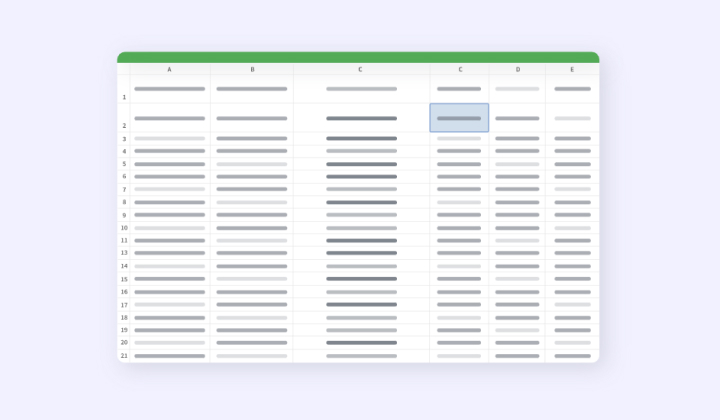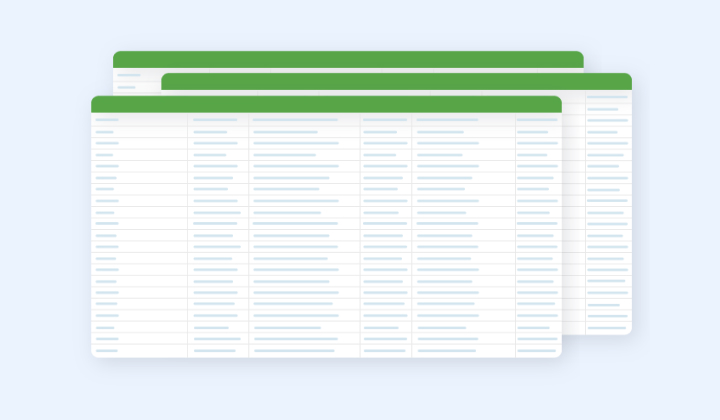Playing With Fire: Why SMEs Continue to Use Spreadsheets

Spreadsheets have been ubiquitous with business operations for over half a century, enabling companies to organise their data and track customer information among many other things.
Low cost and relatively easy to use, spreadsheets continue to be an attractive option for many SMEs looking to manage their data. In fact, findings from our recent whitepaper show that over a third of these businesses mainly use spreadsheets in their current software setup.
But while spreadsheets are a necessity for many, they continue to pose a threat to operations and security. Earlier this month, a spreadsheet revealing students estimated and awarded grades for exams was leaked at a school in Scotland after a cyber attack.
And this is just one recent example of the security risk that spreadsheets pose; there are countless other incidents which have resulted in great financial losses.
With evidence suggesting that SMEs are actually aware of the risks that come with spreadsheets, we inspect some of the reasons why businesses continue to use spreadsheets and evaluate the risks that this software holds.
Drawing on our survey of 500 SME decision makers across multiple industries, this article shows why now might be the best time to transition to a more secure, scalable alternative.
A ‘tried-and-tested’ method
One of the main reasons that SMEs continue to use spreadsheets is because they have a strong reputation across small and enterprise-level companies alike. Referred to as a “universal language for data analysis”, spreadsheets come installed on many computers and provides a recognisable interface to employees transitioning between teams, departments and companies.
Microsoft Excel — the most popular spreadsheet tool — boasts over 750 million users worldwide, which means that when you’re entering any organisation, there’s a good chance Excel is being used in some area of their operations.
Because of their familiarity, business leaders and employees are willing to continue using them, despite the fact that they pose very real security risks. Given this trust, it’s perhaps no surprise that 98% of SMEs use spreadsheets for business-critical tasks.
Among the most common uses included managing stock levels (31.5%), customer data (28.9%) and employee data (25.6%). A third (34%) reported using spreadsheets for tracking invoices, which raises further concerns that all financial activities might be managed through spreadsheets.
There’s no denying that spreadsheets remain useful for some tasks. For dealing with static, rather than dynamic, ever-changing data, spreadsheets remain an effective tool. However, there are considerably better options available for dealing with mission-critical workloads.
SMEs are aware of the risks
Findings from our whitepaper show that there is growing concern amongst users about the security of their spreadsheets. A third of organisations surveyed believe that storing business-critical information on spreadsheets exposes them to cyber security threats, and a fifth (21%) are concerned about how information is being stored on current software.
And with only 8% of surveyed individuals having no concerns about using spreadsheets, it’s clear that users are aware of the dangers of spreadsheets. Finding a solution to replace this software is less clear.
While spreadsheets might provide SMEs with all they need at their initial stages, they do not offer a flexible means of scaling operations in line with business growth. As a company expands and takes on more projects, it is often the case that more separate spreadsheets are required, which poses risks to security and accessibility.
No-Code Solutions for SMEs
In line with SMEs’ focus areas, which include the secure storage of information and accessibility, no-code products are a viable alternative for business operations. No code provides many of the same benefits as any digitization project, but much more quickly and at a lower cost.
Without any coding experience, you can create a useful application that allows teams to effectively organise information. Create a project management tool, asset library or any number of applications that your business might need.
What’s more is that no-code tools are cloud-based, which means that data is securely backed up and accessible wherever employees may be based — a major benefit in our increasingly remote working landscape.
This also means that all data can be managed in one place, accessible anytime, anywhere. By centralising data, no-code tools provide a single source of truth and enhance collaboration across teams.This is a welcome alternative to the chaos of multiple versions of spreadsheets that employees often have to deal with.
Manage your data in Gridfox
When you’re a business owner, you want to be able to analyse and gain insight from your data. Asking questions and getting answers. Achieving this through spreadsheets often requires a lot of manual effort, which is likely to have a negative impact on productivity.
Alternatively, the wide variety of fields available on Gridfox allows users to hone in on specific areas and manipulate data according to the criteria that you select. Making the transition from spreadsheets to a no-code platform like Gridfox enables users to get more from their data and equips businesses with the competitive edge required to succeed.
In all cases, Gridfox allows users to make this transition easily. By importing data from any existing spreadsheets into the platform, you can effectively continue operations without reducing productivity.
If you’re a SME business owner or employee, we hope that these findings will dispel your anxieties. If you’re lacking confidence in your current software setup, the chances are you’re not alone. Thankfully, solutions are available in the form of no-code platforms.
Want to find out more? Get started with Gridfox free here.

